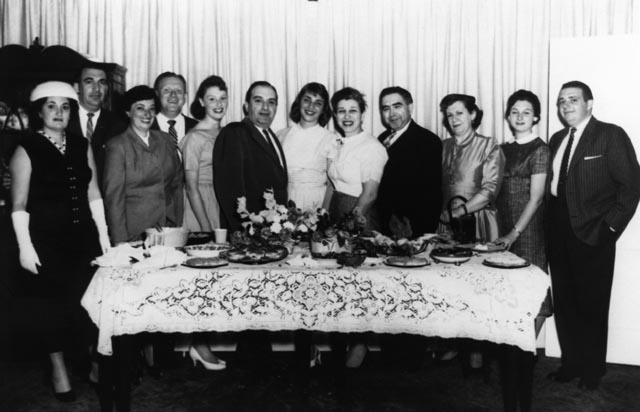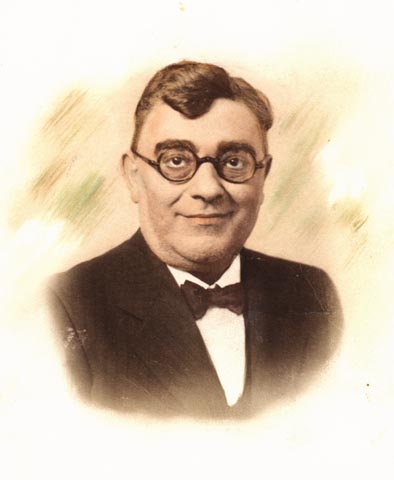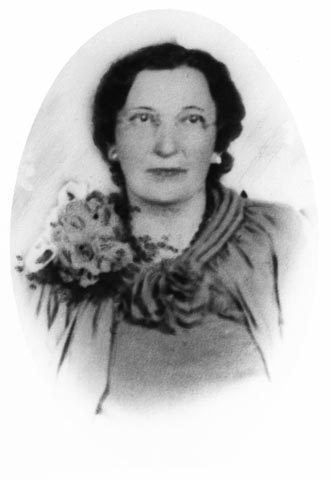RAISING AN AMERICAN FAMILY WITH OLD WORLD VALUES
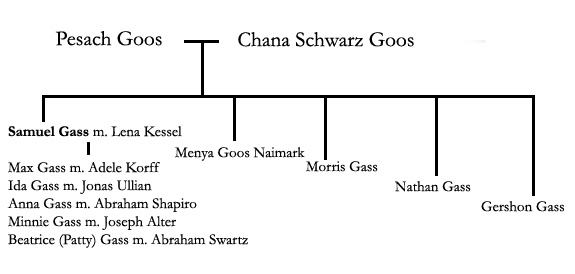
SAMUEL GASS’S BUSINESS PARTNER, Isaac Razin, served as shadchen (matchmaker) and introduced Sam to his niece, Lena Kessel.[1] Lena had been born in 1887 in the town of Kamen Kashirskiy, on the Russian/Polish border. She came to America in 1907 with her father Samuel Kessel, her sister Mary, and brother Harry. Her mother and sister Sarah followed a few years later. Sam and Lena were married on March 23, 1908, in Chelsea, Massachusetts.[2] Compared to Sam who had immigrated in 1903, Lena was a relative greenhorn.
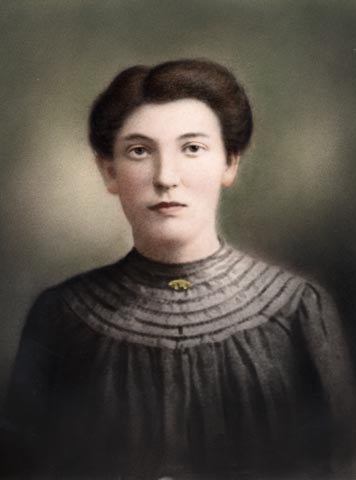
Lena Kessel Gass
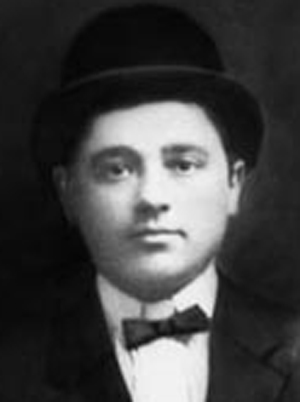
Sam Gass, circa 1910
During the early years of their marriage, both Samuel and Lena worked hard to bring in money. Samuel was becoming a giant in the shmattes (rag) industry in Massachusetts, while Lena took in borders, with a maximum of three at a time. One boarder, Motel, would become their friend for life.
Samuel and Lena became the parents of one son and four daughters:
- Max Harry Gass (1909-1986)
- Ida Marilyn Gass Ullian (1912-1988)
- Anna Gass Shapiro (1915-1958)
- Minnie Gass Alter (1917-1985)
- Beatrice Pauline (Patty) Gass Swartz (1922-1996)
As the family grew the Gasses moved several times, probably seeking larger quarters for their brood. Samuel’s naturalization papers, filed on February 6, 1911, list his address as 178 Second Street in Chelsea.[3] By January 1914, the family had moved to 169 Second Street, where they made their home until at least January 1918.[4] Sometime between the beginning of 1918 and 1920, they moved to 88 Orange Street and occupied the second floor of a three-family house.[5] In 1921 or later, Lena’s parents moved into the ground floor apartment.
The House at 27 County Road
AT SOME POINT BETWEEN the beginning of 1928 and January 1932 (probably 1929).[6] Samuel, now prosperous as an owner of Lion Shoe, moved his family from 88 Orange Street to a huge house at 27 County Road in Chelsea—a three-story home with six bedrooms on the second floor alone. It became a center of extended-family activity. Between Samuel’s two married brothers, Morris and Nathan, and Lena Kessel Gass’s siblings, all of whom were married and lived in or near Chelsea, there were many children.
Almost everyone visited at one time or another, especially on the Sabbath and on Sunday afternoons. Isaac Razin, Samuel’s partner in the rag business as well as Lena’s uncle, was a regular visitor in the Gass home, especially on Saturday nights. Friends called frequently, too. The one exception was the Gootman family. Mary Gootman was Lena’s sister and their husbands had a falling out over the purchase of 27 County Road. Although the men remained business partners, they stopped speaking to each other outside of work and forbad their wives and children from communicating with each other.
Read the chapter about the Family Quarrel.
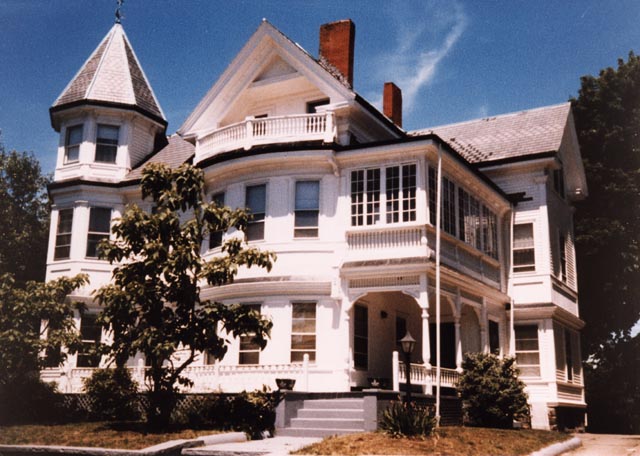
The house at 27 County Road in Chelsea
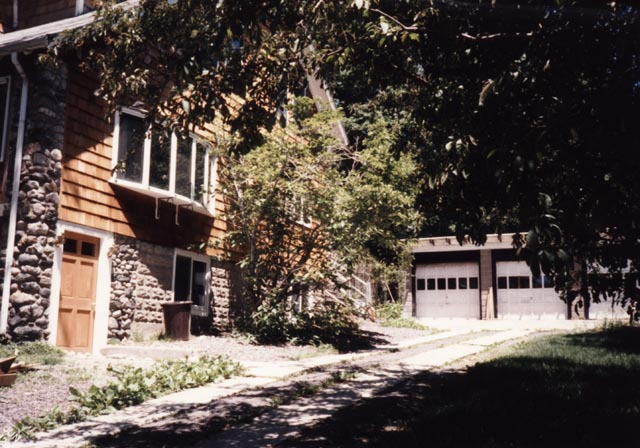
Exterior views of the house on Country Road

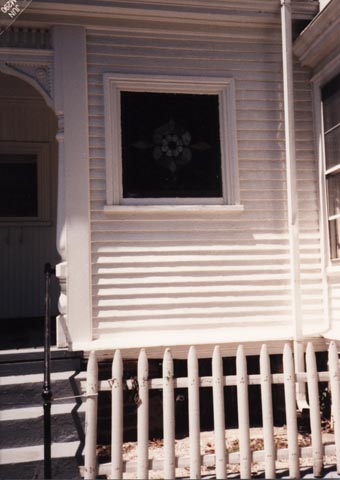
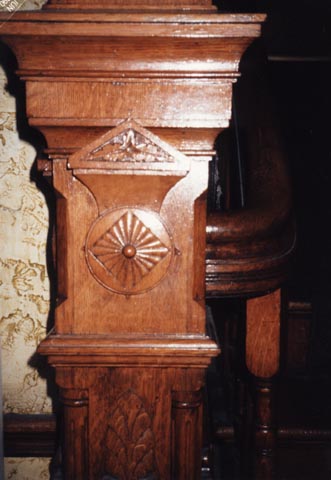
Details from the interior of the house

Long after the children of Samuel and Lena Gass were married and had children of their own, the house at 27 County Road remained the center of family activity. Their grandson, Paul Gass, remembered as a child playing house in the attic with his young cousins. He found 27 County Road a fun place to spend time.
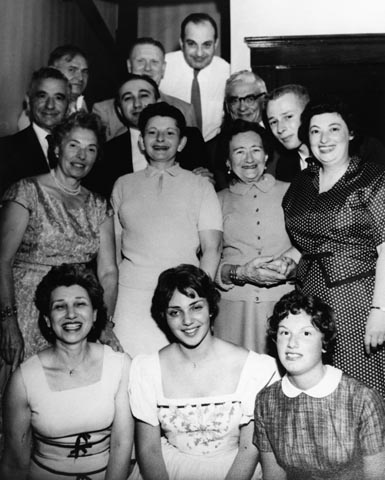
Left to right front row: Adele and Janet Gass, Judy Ullian; 2nd row: Sara Gass, Naomi Sternberg Korff, Sonya Gass, Ida Ullian; 3rd row: Morris Gass, Baruch Korff, Nathan Gass, Paul Gass; back: Abe Shapiro, Jonas Ullian, Max Gass
His cousin, Judy Ullian Shapiro, the daughter of Ida Gass Ullian, remembered visiting there as a child, too:
“We celebrated every holiday at my grandparents’ home in Chelsea. My family stayed in the upstairs attic apartment. It was wonderful, and scary. At night, we couldn’t turn on the lights because my Orthodox grandparents observed the tradition of doing no manner of work on holidays, and turning on lights was considered to be work. So there we were in this big, dark house.
“In the daytime or when my aunts were around, there was always something interesting going on. My sister Shiela was the oldest grandchild and used to sleep over often in Chelsea. She had wonderful memories, especially of Auntie Anna.”
Minnie & Joe Alter; Ida, Jonas & Judy Ullian; Max, Janet & Adele Gass; Samuel & Nesha Korff; Shiela & Sam Fish
“My grandfather would sit in the second living room on the black leather sofa, wearing his gray sweater and gray gloves with the fingertips exposed, and a yarmulke on his head. He always had a cigarette. Next to the sofa was a long, curved ash tray.”
Paul Gass has more cheerful memories of Samuel Gass:
“He was a big man, over six feet tall. I had a very strong regard for him. I remember him sitting at his roll-top desk in his office and people coming in and he would write checks. For some reason I always thought that he came to this country and had a variety store and saved pennies and nickels and somehow got enough money together to make investments. He wore a sweater because he was always cold. My aunt Ida told a story that once they went to camp and he got on a horse bareback and went galloping with no bridal or saddle. To me he was a mysterious figure. I imagined that he was a pirate or an escaped murderer or a person who had escaped oppression. I just had a sense that he had done a lot. I heard stories that during the Holocaust he had gone to Washington to pay off people to get Jewish immigrants into this country. And when he couldn’t get them in here, he got them into Canada or South America. After the war, my mother received a call from a relative in Latin America, probably one of the people Samuel Gass helped. [Unfortunately, the name and address of this relative has been lost.] Sam Gass was a private man who helped a great many people through his vigilance without seeking publicity.”
Sam Gass
Paul’s memory of his grandfather’s height was formed when Paul was small. Sam’s 1944 driver’s license, reveals he was not quite as tall as Paul remembers. Samuel Gass stood 5 feet 9-1/2 inches tall. His date of birth was given as September 9, 1882, and he had dark brown hair and brown eyes.
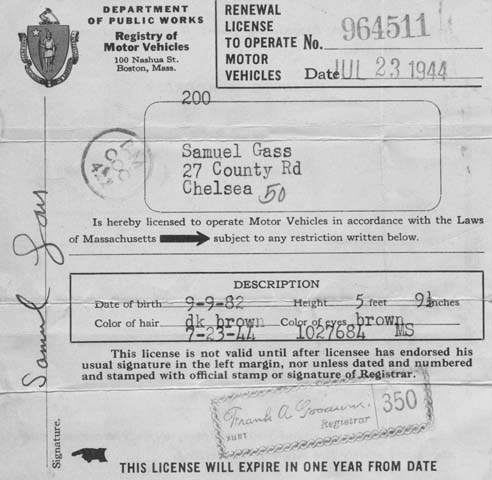
Sam Gass’s driver’s license
Cy Kassel, the son of Lena’s brother Harry, remembered his Uncle Sam:
“I can remember one thing about Uncle Sam. He used to smoke one pack of cigarettes with a single match–when he came to the end of one cigarette, he used it to light another. He wore big horn-rimmed glasses and was always smoking. He screamed and yelled if he got angry, but that wasn’t often. Aunt Lena was very quiet.”
Rita Kassel, Cy’s sister, also recalled the house at County Road:
“What I remember of my Uncle Sam was that every time I came to his house, the first thing he did was hug me and then send me outside. I was a little afraid of him because he was overbearing. I saw him as a big round-faced man, very warm to me. I would run around like a maniac, because I was little and he would send me to my aunt Lena and tell her to take care of me, to give me milk and cookies. I always had to eat. Lena was very quiet. She would hug me and send me out into the yard to play–not to get me out of the way but just so I could enjoy playing. I remember the side porch that led up to the stairs. I loved being at their house. It seems like I was there all the time.”
AS THE HEAD OF THE HOUSEHOLD at 27 County Road, Samuel Gass was a dominant and controlling personality. His force of character was perhaps best demonstrated each and every Shabbos. Samuel was a chain smoker who lit one cigarette from another one. Yet every Friday afternoon just before Lena lit the candles to usher in the Sabbath, he took one last puff and put his cigarettes away until Shabbos ended. Week after week, he went cold turkey from an hour before sunset on Friday until after sunset on Saturday.
Samuel Gass was well informed and quite knowledgeable—he read newspapers daily, including the Jewish paper. He liked to kibbitz about what was new in the world. According to his son’s brother-in-law, Rabbi Baruch Korff:
“Sam Gass was a man of great innate intelligence. Well-known and respected in the Chelsea community, he is remembered as a man who used his resources to bring family members over to America, and to help others in business.”
As Samuel was religious, he brought his children up in a strictly Orthodox home.
According to Max Gass’s wife, Adele:
“My father [Grand Rabbi Jacob Korff] liked and respected Samuel Gass because he was a brilliant, brilliant man. He was self-educated but he was a genius in business. He studied by himself. He observed the Jewish laws to the letter. He made tefillin every weekday, he kept the Sabbath, and to a certain point he made his children observe the Sabbath. My father-in-law was very generous to the outside world and to his sister and brothers, but he always knocked his own children. He was not a good father.”
Louis Gass, a cousin of Sam’s, was devoted to him. His daughter, Thelma Magazine, explained why:
“My father and Shloime[7] were first cousins and there was nothing my father wouldn’t do for him. He would have gotten up in the middle of the night and gone from Lynn to Chelsea to help Shloime. They were extremely close.
“In 1928, my parents were living in New Jersey with my younger sister, Marsha, and me. They had no money and Shloime rescued them. Shloime told my father he would make a place for him in Chelsea. So we moved to Carter Street. At some point, Shloime allowed my father to set up and run a cafeteria in the Lion Shoe Company.
“For a time we lived on County Road, a few houses away from Shloime. At the end of the day, my father would always stop in to say ‘hello’ to Shloime and Lena. When my own son, Joe [Bank], was young, my father would bring him over to Shloime’s. I guess he wanted to show off his family.”
Lena Gass
Lena Gass was by all accounts, a sensible woman, shy and quiet, a good housekeeper, who devoted her life to her husband and children. According to her daughter-in-law, Adele Gass:
“Lena really overworked herself because the house was so big. She only had help once a week or every other week and she took care of all the rest, the cooking and the cleaning.
“Lena never bucked Sam. Theirs was an arranged marriage but she loved him. The only time I heard Lena speak despairingly about her husband, she began her remark with, ‘The big shot said…
“I’m almost positive Sam loved her. When Lena took sick, nobody thought Sam was sad about it, but he would retreat to his room. When I walked in he tried to cover up his feelings but I could tell he was upset. When she died, he did the same thing. There was some warmth to him but he didn’t know how to show affection to his wife and children. He was terrific with his grandchildren. He could joke with them. He was a much better grandfather than a father.
“Lena was a very unassuming, down-to-earth person. She used to come to my apartment every Friday with a challi and fish, and I used to say to her, Ma, if you wanted to bring the fish up, why didn’t you call me? I’d pick you up. But she never put herself first.
“Shortly after Max and I married, we were invited to a wedding. I owned plenty of clothes and I had a black gown with silver trim on the bottom— very, very pretty but Lena wanted me to buy another gown.
“I said to her, Gee, Ma, this gown is beautiful, I only wore it once.
“She said, Nah, my child, go.
“So I went shopping at Filenes’s French shop and I saw this multi-color chiffon gown. It was beautiful. But when the saleslady told me the price I said, Forget it, and came home. Lena visited that day.Did you buy? she asked.
I said, No, it’s ridiculous to spend that type of money when I have a perfectly beautiful gown.
So what did you see? she asked.
I described the gown to her. That same week a package came, and I said to the messenger, It’s not for me, I didn’t order anything.
He said, Lady, it’s got your name on the label, it’s paid for, it’s yours.
So I opened up the package and there was the gown. And when I told her she did too much, she said, You know my child that a mother-in-law has to be much better to her daughter-in-law than to her own daughters because the daughters will forgive her for whatever she does, but a daughter-in-law doesn’t.”
